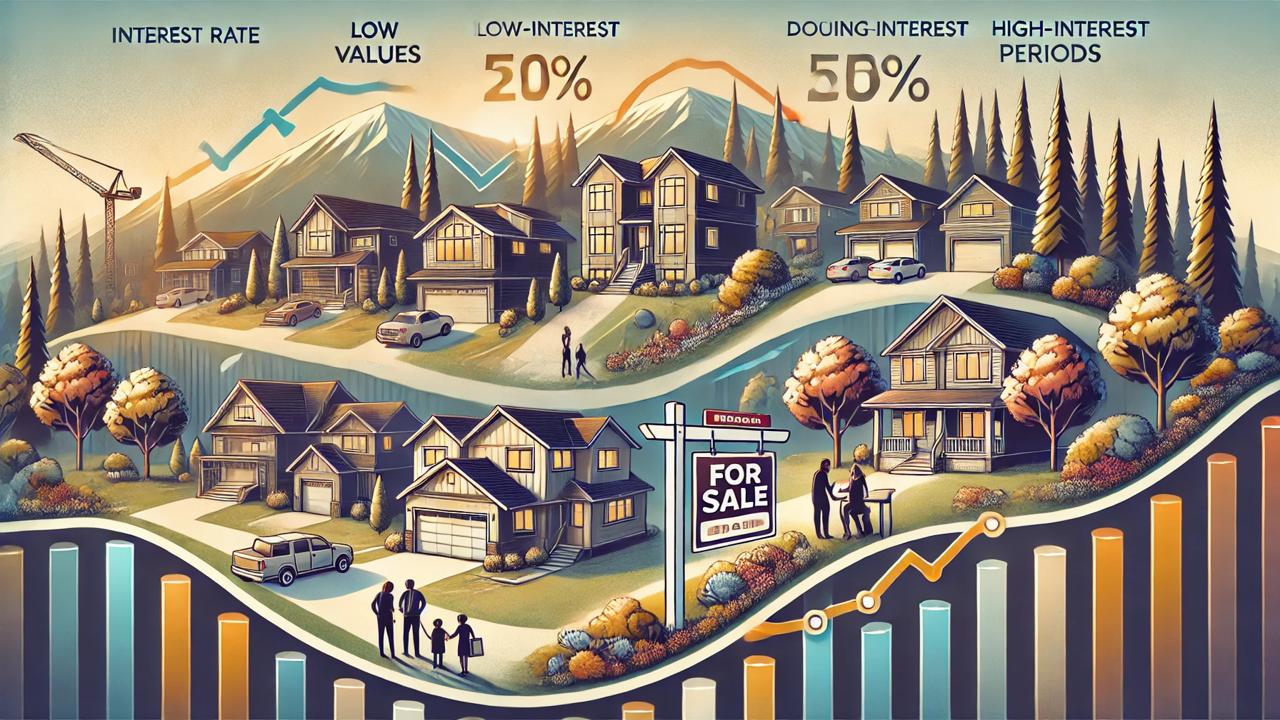
Interest rates play a significant role in shaping the real estate market, influencing everything from property values to buyer behavior. For both homeowners and investors, understanding how fluctuations in interest rates affect the housing market is critical for making informed decisions.
Whether you’re considering investing in luxury homes in Canada, exploring opportunities for affordable housing in Canada, or working closely with real estate agents to navigate the market, interest rates remain a central factor to watch.
This article explores the impact of interest rate changes on property values, providing insights into their effects on buyers, sellers, and the real estate market as a whole.
What Are Interest Rates and Why Do They Matter?
Interest rates represent the cost of borrowing money, determined by central banks like the Bank of Canada. These rates influence mortgage rates, which directly affect the affordability of buying a home.
When interest rates are low, borrowing becomes more affordable, leading to increased demand for properties. Conversely, higher interest rates make borrowing more expensive, often reducing buyer activity. For real estate agents, these fluctuations are key indicators of market trends, helping them guide clients effectively.
Low Interest Rates: A Boom for Buyers and Sellers
Increased Buyer Demand
Low interest rates make mortgages more affordable, allowing buyers to qualify for higher loan amounts. This increased purchasing power often leads to a surge in demand, pushing property values higher.
For buyers looking at luxury homes in Canada, low interest rates can be especially advantageous, as they reduce the cost of financing larger properties.
Rising Property Values
With more buyers in the market, competition intensifies, driving up property prices. Sellers benefit from this environment, as they can often command higher prices and receive multiple offers.
Investor Activity
Low interest rates also attract real estate investors, who see opportunities for higher returns due to rising rental demand and property appreciation.
High Interest Rates: Cooling the Market
Reduced Affordability
When interest rates rise, borrowing becomes more expensive. This reduces the purchasing power of buyers, limiting their ability to afford higher-priced properties.
For those exploring affordable housing in Canada, rising interest rates can make even entry-level homes less accessible, as higher mortgage payments strain budgets.
Decline in Property Values
With fewer buyers in the market, demand decreases, often leading to a slowdown in price growth or even a decline in property values. Sellers may need to adjust their expectations and price properties competitively to attract buyers.
Impact on Luxury Homes
High interest rates tend to affect the market for luxury homes in Canada more significantly, as these properties require larger loans. Buyers in this segment may delay purchases, resulting in slower sales and potential price reductions.
Effects on First-Time Buyers
First-time buyers are particularly sensitive to interest rate changes.
Advantages of Low Rates
When interest rates are low, first-time buyers can secure affordable mortgages, making it easier to enter the market. Lower monthly payments allow them to allocate funds toward other expenses or upgrades.
Challenges of High Rates
Rising interest rates increase monthly mortgage payments, often making it difficult for first-time buyers to qualify for loans. This can delay their ability to purchase a home or force them to consider smaller or less expensive properties.
For first-time buyers working with real estate agents, understanding how interest rates impact affordability is crucial to setting realistic expectations.
Regional Variations in the Impact of Interest Rates
The impact of interest rate changes can vary by region, influenced by local economic conditions and housing demand.
Urban Centers
Cities like Toronto and Vancouver, known for their competitive markets, often experience amplified effects. Low interest rates drive significant demand, while high rates can quickly cool activity.
Smaller Cities and Rural Areas
In smaller cities and rural areas, the effects may be less pronounced. For example, affordable housing in Canada is often found in these regions, where lower property prices mitigate the impact of rising interest rates.
Luxury Markets
Regions with a concentration of high-end properties, such as certain neighborhoods in Montreal or Calgary, are more sensitive to rate increases, as buyers in this segment rely heavily on financing.
The Role of Real Estate Agents
Real estate agents play a pivotal role in helping buyers and sellers navigate market changes caused by interest rate fluctuations.
For Buyers
Agents can provide valuable insights into how rate changes impact affordability, guiding buyers toward properties that fit their financial situation. They also help clients explore mortgage options and connect them with lenders offering competitive rates.
For Sellers
Sellers benefit from agents’ expertise in pricing strategies. In a rising rate environment, agents can recommend adjustments to make properties more attractive to buyers. During periods of low rates, agents can leverage increased demand to negotiate higher offers.
Market Analysis
Experienced agents stay informed about market trends, including interest rate forecasts, allowing them to offer strategic advice tailored to their clients’ goals.
Long-Term Implications of Interest Rate Changes
Interest rate changes don’t just affect short-term market activity; they also have long-term implications for property values and investment strategies.
Equity Growth
Low rates often lead to faster property appreciation, increasing homeowners’ equity. This can provide opportunities for refinancing, upgrades, or leveraging equity for future investments.
Market Stability
While high rates may temporarily slow the market, they often contribute to long-term stability by preventing unsustainable price growth.
Investment Decisions
Investors must consider how rate changes affect rental yields and property appreciation. In high-rate environments, focusing on properties with strong cash flow becomes more critical.
Preparing for Rate Changes as a Buyer or Seller
Tips for Buyers
- Monitor Interest Rates: Stay informed about rate trends and forecasts to plan your purchase effectively.
- Get Pre-Approved: Lock in a favorable rate by getting pre-approved for a mortgage.
- Work with Experts: Collaborate with real estate agents and mortgage advisors to understand your options.
Tips for Sellers
- Price Competitively: Adjust pricing strategies to align with market conditions.
- Highlight Value: Showcase unique features that make your property stand out, especially in a high-rate market.
- Stay Flexible: Be open to negotiations and consider incentives to attract buyers.
Balancing Supply and Demand in a Changing Market
Interest rate changes often create imbalances between supply and demand. Low rates increase demand, while high rates reduce it. Balancing these dynamics requires a collaborative effort between buyers, sellers, and industry professionals.
Impact on Affordable Housing
Policies aimed at promoting affordable housing in Canada can mitigate the effects of rising rates by increasing supply and providing incentives for first-time buyers.
Opportunities in Luxury Markets
Buyers interested in luxury homes in Canada may find opportunities during high-rate periods, as reduced competition can lead to better deals.
Conclusion
Interest rate changes have a profound impact on property values, influencing everything from buyer behavior to market dynamics. For homeowners, buyers, and investors, staying informed about these changes is essential for making sound decisions.
Whether you’re searching for affordable housing in Canada, exploring luxury homes in Canada, or working with real estate agents to navigate the market, understanding the relationship between interest rates and property values can help you achieve your goals.
By planning strategically and adapting to market conditions, you can succeed in any real estate environment, regardless of rate fluctuations. As the market evolves, aligning your strategies with current trends will ensure that you remain ahead of the curve






Leave a Reply
You must be logged in to post a comment.